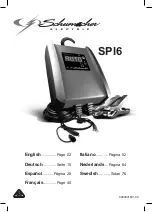
FOR RECHARGEABLE TWO-WAY RADIO BATTERIES – NiCd / NiMH / Li-Ion / LiPo
SIX-UNIT RAPID CHARGER
Model: PABA1417
USER MANUAL
1
Introduction
Thank you for purchasing this six-unit rapid charger from 49er Communications. It’s a high quality product is designed for use with
up to six rechargeable two-way radio batteries. With the appropriate charging pod installed, it can charge batteries with these cell
types: nickel cadmium (NiCd), nickel-metal hydride (NiMH), lithium ion (Li-Ion), or lithium polymer (LiPo).
For a complete list of charging pods available for this charger, contact our customer service department at
800-552-0707 x101
.
The lightning flash and arrowhead within
the triangle is a warning sign alerting you of
‘dangerous voltage’ inside the product.
CAUTION: TO REDUCE THE RISK OF
THE ELECTRIC SHOCK, DO NOT REMOVE COVER.
NO USER SERVICEABLE PARTS
ARE INSIDE. REFER ANY SERVICING TO
QUALIFIED SERVICE PERSONNEL.
The exclamation point within the triangle is
a warning sign alerting you of important
instructions accompanying the product.
1. Read and follow these instructions. Heed all warnings. Keep
this user manual for future reference.
2. Do not operate this charger near water or where moisture
is present. Do not operate this charger where it could be ex-
posed to dripping, splashing, or spray from water or other
liquids. Do not place containers with liquids, such as soft
drinks or flower vases, on or near the charger. Clean with a
dry cloth.
3. Follow all installation guidelines. Do not block any ventilation
openings on the charger. Do not place near any heat sources
such as radiators, heat registers, stoves, amplifiers, or other
devices that produce heat.
4. Only use the power supply provided with this charger. For
safety reasons, do not modify the grounding type plug on
the power cord. The grounding type plug has two blades and
a third grounding prong. If this plug does not fit into your
outlet, consult a qualified electrician for replacement.
5. Protect the power supply and cords from being walked on.
Do not allow the power cord to be pinched or bent at a sharp
angle, particularly near the wall outlet or where it connects
to the charger.
6. Only use attachments / accessories supplied with this char-
ger or specified by 49er Communications.
7. Unplug this charger during lightning storms or when not
used for an extended period of time.
8. Refer all repairs for servicing to qualified service personnel.
Servicing is required when the charger has been damaged in
any way. This includes dropping the charger, spilling liquids
on the charger, causing objects to fall into the charger, exces-
sive wear to the power cord or plug, exposing the charger
to rain or moisture, or when the charger fails to operate in a
normal manner.
C A U T I O N
RISK OF ELECTRIC SHOCK
DO NOT OPEN
Caution
1. Never charge alkaline or dry cell batteries with this charger. Do not charge NiCd, NiMH, Li-Ion, or LiPo batteries unless they are
designed with overcharge protection.
2. Do not attempt to charge a battery without first confirming that the appropriate charging pod is installed.
3. Disconnect charger from the power supply before installing, adjusting, removing, or cleaning the charging pod.
4. Use only charging pods and the power supply designed for this charger. Using similar parts available from other manufacturers
may damage the charger or batteries.
5. Make sure the contacts in the charging pod and on the battery are clean, otherwise the battery may not fully charge.
6. Do not allow wire or metal objects to touch contacts in the charging pod or any internal part of the charger.
7. Do not remove the charger’s housing or make any modification to the charger.
8. Turn charger off when not in use. The power on / off switch is located on the right side of the charger.
9. Always charge new batteries completely before initial use. Do not charge batteries that have been exposed to excessive heat.
10. Recycle batteries when they can no longer be used. Do not discard unwanted batteries in the trash or incinerate. Batteries ex-
posed to fire or excessive heat may explode.
Important Safety Information





















